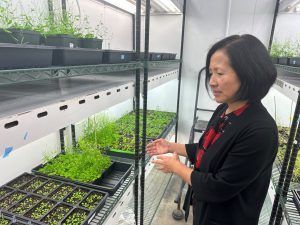(Ames, Iowa) – An Iowa State University researcher has received national support to take a deeper dive into a gene that helps plants thrive and survive in the face of environmental threats, with the goal of creating more resilient crops to feed the world. According to the Iowa Capital Dispatch, Michelle Guo, an assistant professor of genetics, development and cell biology at ISU, has spent almost 20 years researching a gene found in plants called Feronia, which impacts many different plant functions and processes. Now, with an almost $2 million grant, Guo and her fellow researchers are looking at the gene in different cell types to try and shut down certain functions while keeping others.
The gene has a hand in ensuring plants both grow well and can protect themselves from stress, Guo said. For example, removing or disrupting the gene creates what she called a “dwarf plant,” and the plant would also become more sensitive to things like salt, which would impact its growth.
Guo received a five-year, $1.8 million grant from the National Institute of General Medical Sciences in order to support her research. The grant, called Maximizing Investigators’ Research Award for Early Stage Investigators (MIRA), doesn’t fund a specific project or area of study, but rather funds Guo directly, so she can utilize the award however she needs.
Feronia has “been in the public eye” for about 20 years and Guo been researching it for nearly that long alongside other groups. Gua said she hopes other researchers are approaching the work from different angles so they could eventually inform other people’s research.

Iowa State University professor and researcher Michelle Guo is researching a specific plant gene in order to try and make plants more resilient under stress. (Photo by Brooklyn Draisey/Iowa Capital Dispatch)
With the effects of climate change becoming more and more apparent, Guo said it’s more important than ever that crops become able to produce large yields even when they’re in less-than-ideal conditions. Creating a more food-secure world is the ultimate goal behind this research, along with helping young scientists further their careers by completing and publishing their work on this important subject.








